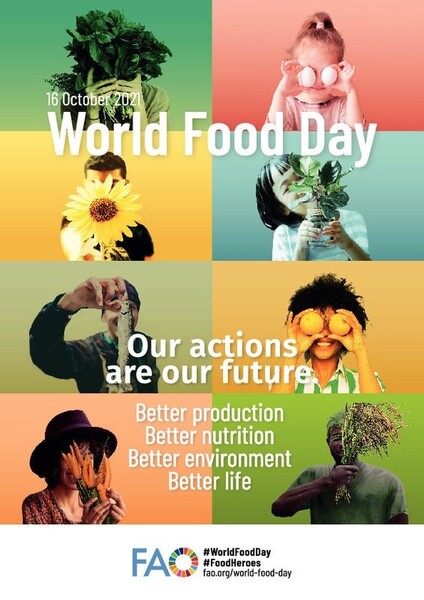World Food Day (also known as World Hunger Day) takes place every year on October 16. Its purpose is to inform the public about the current food situation in the world and to draw attention to hunger in the world.
World Food Day was first introduced on October 16, 1979, as it was on this day in 1945 that the Food and Agriculture Organization of the United Nations (FAO) was founded as a specialized agency of the UN.
Collective action in 150 countries makes World Food Day one of the most celebrated days on the UN calendar. Hundreds of events and outreach activities bring together governments, businesses, NGOs, media and the general public. They promote global awareness and action on behalf of the hungry and the need for healthy diets for all.
World Food Day facts
- More than 3 billion people (nearly 40 percent of the world's population) cannot afford a healthy diet.
- Nearly 2 billion people are overweight or have poor diets and sedentary lifestyles. By 2030, associated health costs could exceed $1.3 trillion per year.
- Food systems currently employ 1 billion people, more than any other sector.
- 10 percent of people are affected by food insecurity due to bacteria, viruses, parasites or chemicals, for example.
- Smallholder farmers produce more than 33 percent of the world's food, despite challenges such as poverty and lack of access to resources such as finance, education and technology.
- Globally, 20 percent more women than men ages 25-34 live in extreme poverty, and more than 18 percent of women live on less than $1.90 per day.
- The world's food systems currently account for more than 33 percent of global anthropogenic greenhouse gas emissions.
- 55 percent of the world's population lives in cities, rising to 68 percent by 2050.
- 14 percent of the world's food is lost due to inadequate harvesting, handling, storage and transportation, and 17 percent is wasted at the consumer level.
- Biodiversity is suffering and soils are being degraded by intensified agriculture, increasing consumption of resource-intensive foods, and conversion of natural ecosystems for crop production or pasture.
- Climate change affects the rural poor, agricultural yields, and productivity, and may contribute to changes in the nutritional composition of important staple foods, including reductions in protein content and some essential minerals and vitamins.
The future of food is in all our hands
Agri-food is a complex concept that may seem unrealistic to many. The choice of food and the way it is produced, prepared, cooked and stored make society an essential and active part of this system.
A sustainable agri-food system is one in which a variety of sufficient, nutritious, and safe food is available to everyone at an affordable price, and no one goes hungry or suffers from malnutrition. Shelves are filled at local markets or grocery stores, but less food is wasted and the food supply chain is more resilient to shocks such as extreme weather, price spikes, or pandemics, while limiting, not exacerbating, environmental degradation or climate change. Sustainable agricultural and food systems ensure food security for all without compromising the economic, social, and environmental foundations for generations to come.
Why care?
Agricultural and food systems employ 1 billion people worldwide, more than any other sector of the economy. Moreover, the way food is produced, consumed and wasted takes a heavy toll on the planet, straining natural resources, the environment and the climate. Food production too often pollutes or destroys natural habitats and contributes to species extinction.
Our contribution to safeguarding our food and promoting sustainable production methods
Together with antibiotic resistance and pandemics, climate change is one of the greatest challenges of our time. This year's World Food Day is dedicated to sustainable agricultural production methods. As part of our work, we are in exchange with stakeholders from agriculture as well as with authorities and make a contribution to climate change mitigation based on scientific work.
On the one hand, we ensure that high-quality food can be produced through soil tests, water tests and variety tests, and we contribute to biodiversity and the conservation of genetic resources with our gene bank. On the other hand, we conduct research in the field of sustainable agriculture (e.g. climate-smart varieties) and thus try to find ever new approaches to solutions. We are always in dialog with society to enable the continuous involvement of consumers and relevant stakeholders.
 2
2